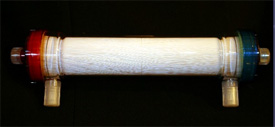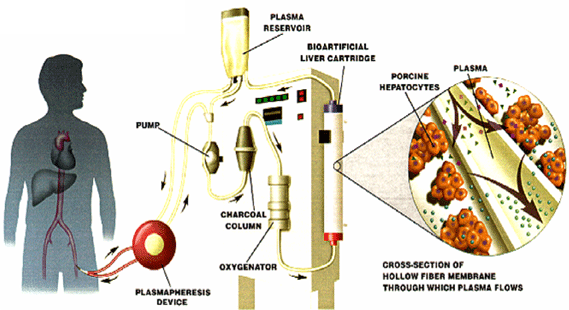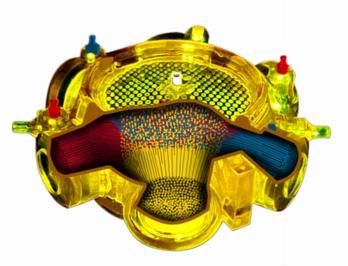Liver Assist Devices
for treatment of liver failure
Bioartificial Livers
Bioartificial liver assist devices attempt to further replicate liver function over artificial liver assist devices by using hepatocytes to address specific metabolic tasks. In extracorporeal liver perfusion (ECLP), an explanted liver of human or xenogeneic origin is connected to the patient blood circulation outside the body. Due to the difficulty in obtaining liver cells this way, different types of bioreactors have been designed to keep isolated liver cells in culture. Cultured liver cells can then be used as needed for extracorporeal liver support. Many different designs have been created exploring multiple cell sources.
The Extracorporeal Liver Assist Device (ELAD) made by Vital Therapies uses about 200 g of cells expanded from the human hepatoblastoma cell line C3A. The cells are placed within an extracapillary space separated from plasma by the capillary membranes. The blood plasma passes a charcoal adsorber and membrane oxygenator before entering the bioreactor to enhance native liver like function. Four clinical trials have been conducted and the safety of the device has been validated.

ELAD Cartridge
HepatAssist made by Arbios is a system that uses cryopreserved porcine hepatocytes in an environment similar to the ELAD. It was designed to treat acute liver failure and acute on chronic liver failure in patients with little remaining liver function. The advantage of using porcine cells is that they are available in large quantities. The cells are immobilized in the bioreactor by a membrane in order to prevent an immune response in the patient. Hepatassist became the first bioartificial liver assist device tested in FDA approved phase 2/3 clinical trials. A total of 171 patients, 86 in the control group and 85 in the bioartificial liver treatment group, were studied by Demetriou et al. Patients with fulminant/subfulminant hepatic failure and primary hepatocyte nonfunction following liver transplantation were included in the study, demonstrating the safety of the system and an improved 30 day survival in a subgroup.

HepatAssist System
The modular extracorporeal liver support (MELS) system was designed by the Charité Virchow Clinic in Berlin. This device consists of 3 interwoven capillary bundles for hepatocyte culture in a polyurethane housing. These capillary bundles serve to oxygenate and perfuse the cell culture with patient plasma. A unique feature of the MELS system is that it uses primary porcine hepatocytes as well as human hepatocytes isolated from livers unsuitable for transplantation. This module is combined with SPAD and continuous veno-venous hemodiafiltration techniques for improved efficacy. The combination of approaches puts fewer burdens on the hepatocytes. A phase 1 clinical study on 8 patients was performed using porcine hepatocytes and 12 patients are currently being treated with primary human hepatocytes in another clinical trial.

CellModule Bioreactor for MELS
Further Development >